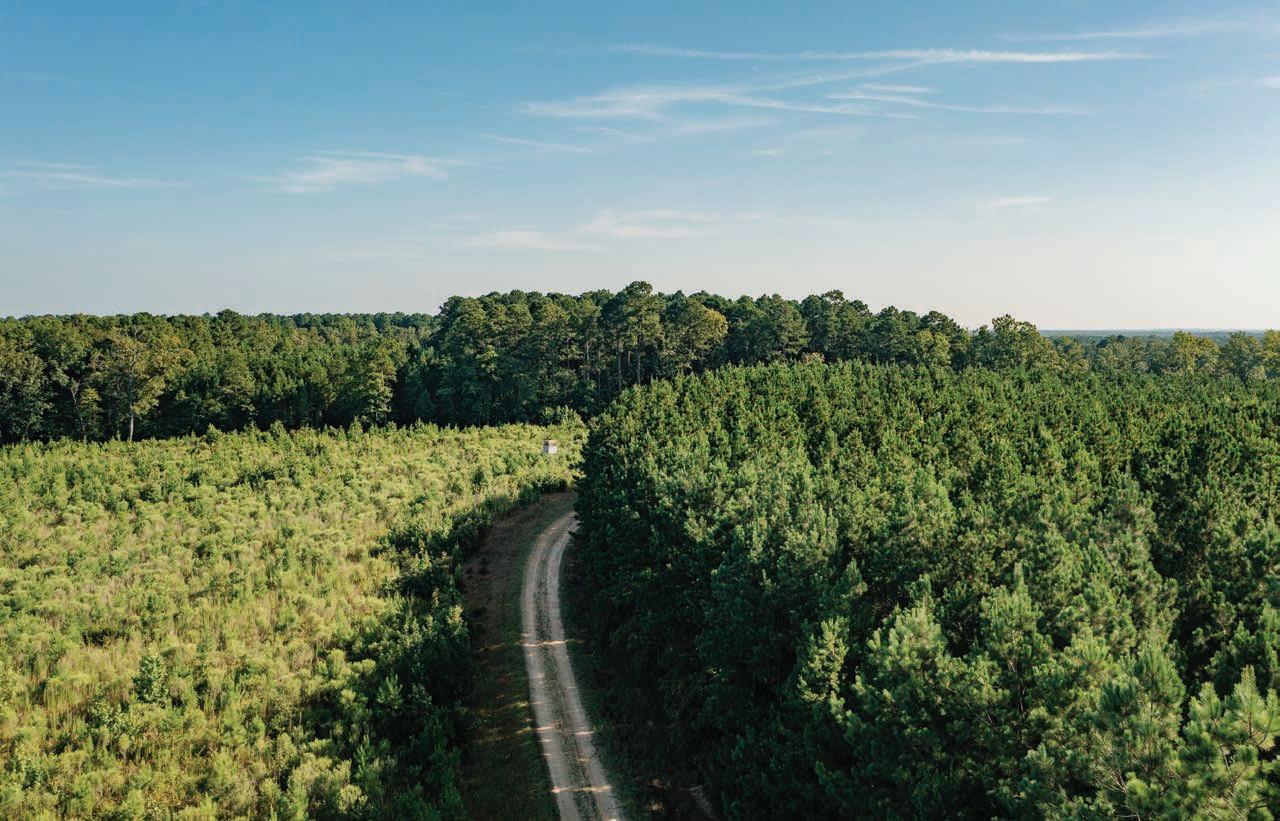Rural Scene THE
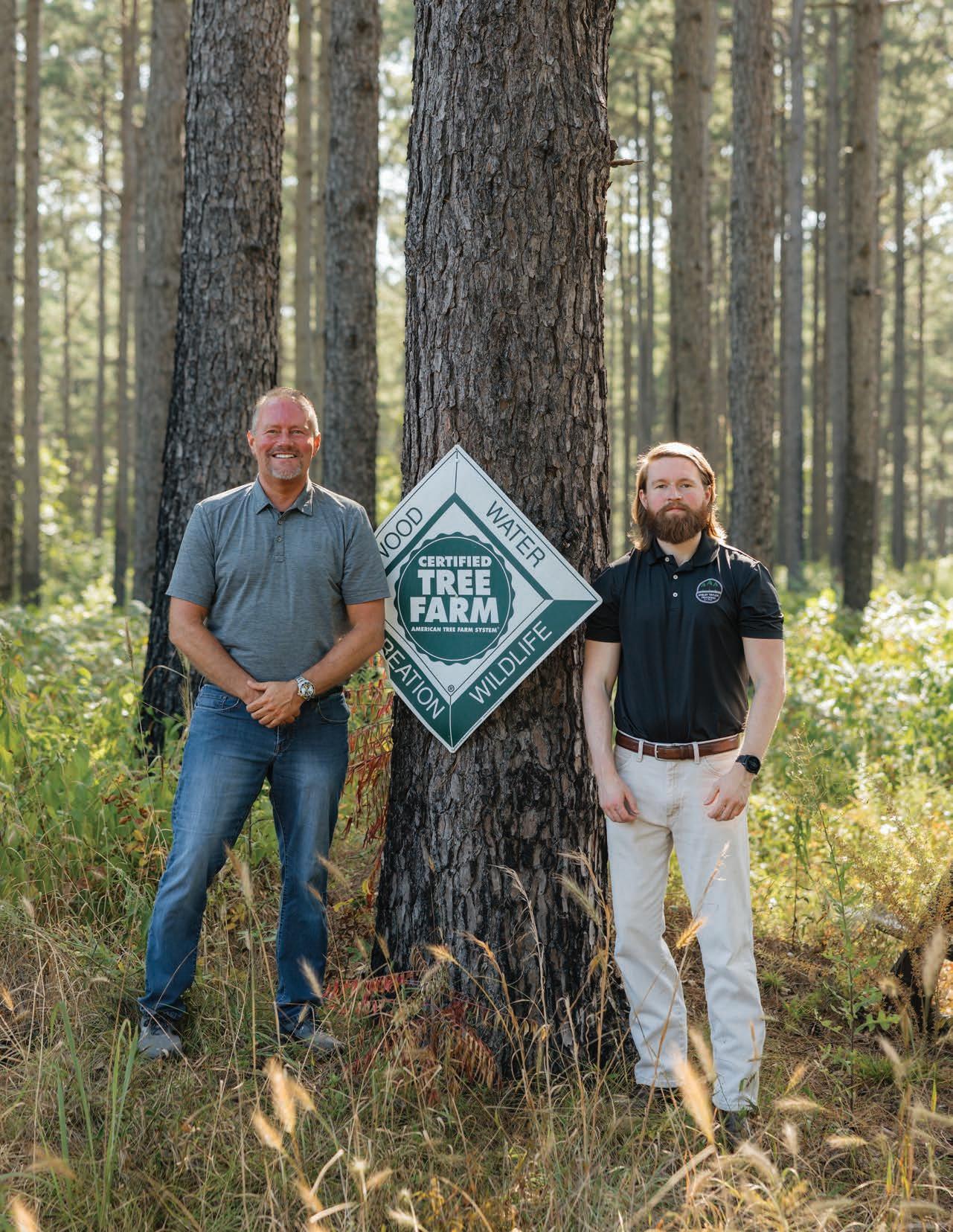
BUILT TO LAST TAYLOR FAMILY'S TIMBER ROOTS RUN DEEP IN ARKANSAS SOIL FORESTRY IN F OCUS FROM FACTS TO FINANCING—DISCO VER HOW TIMBER SHAPES ARKANSAS’ ECONOMY
FALL 2025


BUILT TO LAST TAYLOR FAMILY'S TIMBER ROOTS RUN DEEP IN ARKANSAS SOIL FORESTRY IN F OCUS FROM FACTS TO FINANCING—DISCO VER HOW TIMBER SHAPES ARKANSAS’ ECONOMY
FALL 2025
Farm Credit of Western Arkansas is a customer-owned financial cooperative providing financing and related services to farmers, ranchers, rural homeowners, agribusinesses and timber producers in 41 western Arkansas counties.
With a loan volume of $1.9 billion, Farm Credit of Western Arkansas is a member of the 109-year-old Farm Credit System, a nationwide network of borrower-owned lending institutions providing more than $428 billion in loans to rural America.
Discover the director and nominating candidates up for election and how your vote makes a difference.
Arkansas Forestry by the Numbers
An easy-to-read infographic highlighting the importance of forestry in our state.
A look inside the Arkansas Forestry Association and the work they do for the industry.
See the list of 40 Farm Credit of Western Arkansas scholarship recipients for 2025.
Fair Fun Guide
Tips and ideas for making the most of your local county fair visit.

What began with two chainsaws and a dream has grown into one of south central Arkansas’ most trusted family businesses. Meet the Taylors and discover the legacy behind Shelby Taylor Trucking. Story starts on page 6.
Alma 641 Hwy 71 North (479) 430–7287
Kaleb Brooks, Daniel Keeton, Joyce Ridenour
Arkadelphia 2858 Walnut (870) 246–8061
Benton 15227 1-30 South (501) 860–6391
Dylan McDaniel
Bentonville 3600 SW Regional Airport Blvd. Suite 16 (479) 273–3311
Dilynn Dodd, Catherine Nguyen
Clarksville 1007 Interstate Dr. (479) 754–2876
Shelby Bradley, Baxter Wallis
Danville 302 E 5th St. (479) 495–2711
Kevin Morrison
De Queen 800 E Magnolia Ave. (870) 584–3113
Jordan Icenhower
Fort Smith 12907 Hwy 71 South (479) 434–4040
Kaleb Brooks, Daniel Keeton, Joyce Ridenour
Greenbrier 89C N Broadview St. (501) 679–5464
Kori Kimes, Emily Lemieux
Harrison 129 W Industrial Park Rd. (870) 741–2020
What makes timber lending unique, and how Farm Credit helps borrowers succeed.
Future Legacy Conference 2026
Details about the free event connecting and supporting young and beginning farmers.
Brad Matlock, Brady Willis
Hope 1722 E 3rd St. (870) 777–6704
Clay Lance, Trevor Pipkin
Huntsville 14238 Hwy 412 (479) 738–6622
Trey Villines
Magnolia 1703 Pittman St. (870) 234–8611
Caleigh Watlington, Milly Lindsey
Mena 1607 Hwy 71 North (479) 394–1027
Rex Dollar
Morrilton 1329 Hwy 9 (501) 354–2377
Hank DeSalvo
Nashville 302 W Bishop (870) 845–2221
Kara Sharp, Kyle Webb
Ozark 1808 Farm Credit Dr. (479) 667–3855
Israel Lopez, Mike Gibbons
Paris 3772 W Hwy 22 (479) 963–2841
Kathy Schluterman
Prairie Grove 1181 E Heritage Pkwy (Hwy 62) (479) 400–6160
BJ Kirk
Russellville 2797 E Parkway (479) 968–5030
Shelby Bradley, Baxter Wallis
Siloam Springs 4970 Hwy 412 East (479) 524–6754
Texarkana 2305 Trinity Blvd. (870) 772–1882
Colton Hewitt, Brady Jackson, Wyatt Wooten
Tontitown 1091 W Henri De Tonti Blvd. (479) 717–6740
Charlie Holder

Arkansas’ land mass covers vast swaths of forestry. As a state, we continue to set the mark for the nation as a key player in the timber industry. It probably comes as no surprise that just over half of the land is covered in timber, and Arkansas has a proven track record of sustainable forest practices and is a force to be recognized within the timber industry.
Forestry remains a cornerstone of Arkansas’ economy, contributing to the state’s GDP and supporting over 50,000 jobs. However, employment in core sectors like logging and forestry saw declines in 2023, with both logging and forestry down. Despite this, labor income rose modestly across most categories, and GDP contributions from furniture and forestry surged.
The state’s timberland is largely privately owned. This ownership structure, combined with a skilled manufacturing workforce and robust educational infrastructure, positions Arkansas well for innovation and growth.
The first quarter of 2025 brought mixed news for timber prices. Pine sawtimber rose by 10% to $25.42/ton, while oak sawtimber fell by 6.6% to $48.18/ton. Hardwood pulpwood continued its downward trend, dropping 16% to $6.19/ton. These fluctuations reflect broader market dynamics, including housing starts, interest rates, and mill capacity.
Chair Cody Jones, Mansfield
Vice Chair Steve Young, Paris
Steve Burke, Prescott
Renny Chesshir, Alma
Kim Hogan, Ozark
Ron Hubbard, London
President and CEO Brandon Haberer
Julie Lively, Fulton Allen Moore, Lincoln
Gerald Strobel, Subiaco
Elizabeth Walker, Horatio Mark Wilcox, Greenbrier
A notable trend is the persistent oversupply of standing timber. Since 1978, Arkansas’ timber inventory has nearly doubled, creating downward pressure on prices and increasing susceptibility to pests and disease.
Arkansas is investing in the future of timber through initiatives like the Anthony Timberlands Center for Design and Materials Innovation, which aims to expand the use of wood in architecture and product design. Additionally, companies like Weyerhaeuser are responding to market signals by announcing new facilities focused on small-diameter timber processing. Interest rate projections suggest a potential rebound in housing starts, which could stimulate demand for sawtimber. If realized, this would mark a turning point for stumpage prices and harvesting activity.
While 2024 was marked by uncertainty, 2025 offers a cautiously optimistic outlook. With strategic investments, favorable policy incentives, and a deep resource base, Arkansas is well-positioned to lead the next chapter of American forestry. The industry’s resilience and adaptability will be key as it navigates economic shifts, environmental challenges, and evolving market demands.

Brandon Haberer President and CEO
The Rural Scene is produced for members and friends of Farm Credit of Western Arkansas.
Address comments and story ideas to:
Editor, The Rural Scene Farm Credit of Western Arkansas 5177 US Hwy 64 W • Russellville, AR 72802
Editor Lindsey Holtzclaw • Lindsey.Holtzclaw@myaglender.com
Contributing Writer & Photographer
Abby Scruggs • Abby.Scruggs@myaglender.com
Flossie Glinski myaglender.com
Article quotes have been edited for content and appropriateness.


My time as board chair is coming to an end. A few years ago, we voted to set term limits on board leadership, and this is one of the many good decisions we’ve made together over the past four years. Serving as chairman of Farm Credit of Western Arkansas has been an honor and truly one of the best experiences of my life.
As I write this final column, I’m attending a leadership class on the battlefield at Gettysburg. Standing here reminds me of how much has changed, not only in my perspective, but also in our association over the past four years. As a board, we’ve made it a priority to invest in training and to be the most informed and effective board we can be.
I’m proud of what we’ve accomplished. Together with our CEO and senior management team, we’ve worked to keep our association moving forward. I believe the best way to keep making progress is simple—work together and find solutions. In recent years, we’ve restructured parts of the organization and built a new central office in Russellville. Both of these changes will help us be more efficient and better serve not just our members, but also our employees.
In everything we do, our focus is on you—the member. You are the backbone of this association. We believe so strongly in the seven cooperative principles that we made adhering to them an association goal. We revamped our scholarship program so it can reach more students, putting more weight on involvement and well-roundedness instead of just test scores. We made a large donation to Arkansas Tech University to help them build a new agriculture facility to educate and prepare the next generation of farmers, ranchers, and agriculturists. When I graduated from Tech back in 1999, I never imagined I’d one day be in a position to give back to a school that did so much for me. And I’m especially proud that, during my time as chair, we’ve been able to return record patronage to you year after year.
Our association is strong, and the future looks bright. It is a true testament to the hard work our CEO and his team have been doing, and to the teamwork mindset of our board. Change isn’t always easy, but I believe we must keep adapting and evolving or risk falling behind. Remember, what sets Farm Credit of Western Arkansas apart from other financial institutions is that we will truly be there for you in not only the good times but the hard times, too.

Cody Jones Chair, Board of Directors Farm Credit of Western Arkansas
Your ballot helps shape Farm Credit leadership and supports youth in agriculture. For every ballot returned, Farm Credit donates $10 to FFA and 4-H.
.
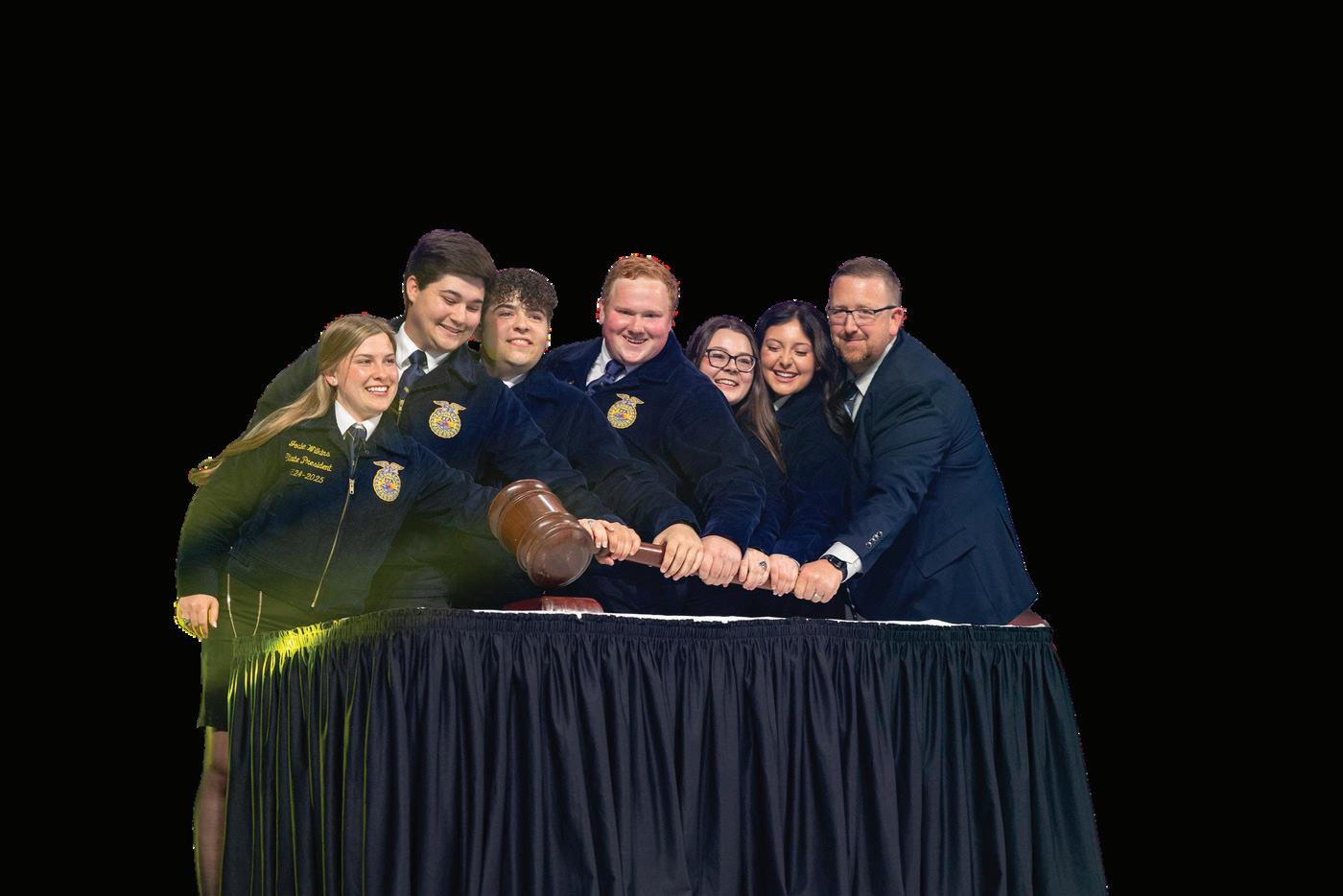




Ballots will arrive in your mailbox, voting is your right and responsibility as a cooperative member
• Director candidate information and ballots will mail on September 4, 2025. Ballots will be addressed to voting stockholders as of record date.
• Review candidate information, complete ballot, and return in postage-paid envelope provided. You may vote for one director in each area up for election.
• Voting stockholders are responsible for electing directors and nominating committee members annually.
• Ballots must be received by 4:30 PM on October 2, 2025. Results will be announced on or about October 4 and posted at all branch offices and at myaglender.com. Postcards will also be mailed to members.

2025 Director
Listed Alphabetically (All positions are a four-year term.)
AREA 1
AREA 2
AREA 3
Ralph “Allen” A. Moore Washington County
Jennifer J. Cook Faulkner County
Brandon Clyde Tullis Nevada County
Carol “Ann” A. Russell Sebastian County
Maxel “Todd” T. Durning Franklin County
Elizabeth F. Walker Sevier County
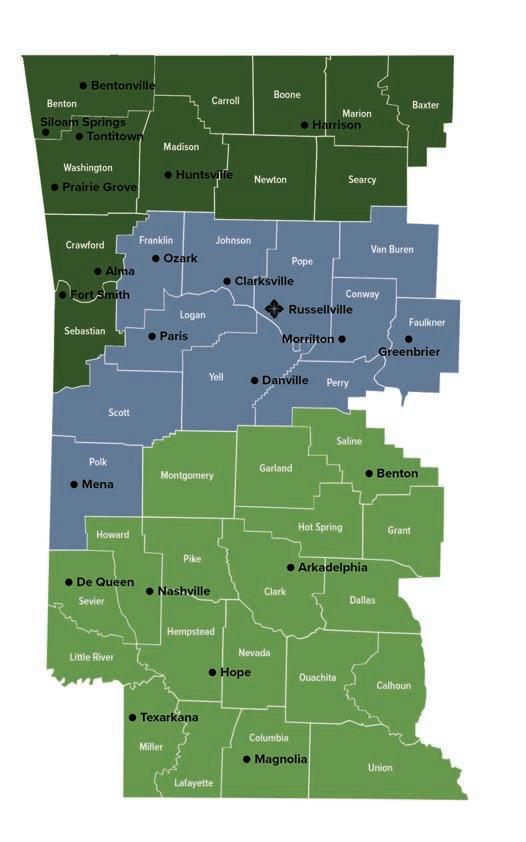
(All areas for a one-year term.)
Chad E. Amos • Benton County
Bradley K. Woodward • Washington County
Nathaniel W. Sterling • Sebastian County
Jason W. Thompson • Sebastian County
Kevin Hightower • Crawford County
Michelle Pass • Sebastian County
Robert W. Caldwell • Yell County
Ernest "EJ" J. Neissl • Franklin County
Ronnie R. Whitley, Jr. • Logan County
Wade Wiedower • Faulkner County
Troy L. Weatherley • Faulkner County
Rodney A. Wiedower • Faulkner County
Rainna K. Ghormley • Hempstead County
Melanie S. Glass • Lafayette County
Jake Cornelius• Nevada County
Judd Milam• Nevada County
Chance C. Cummings • Hempstead County
Suzanne L. Watkins • Hempstead County
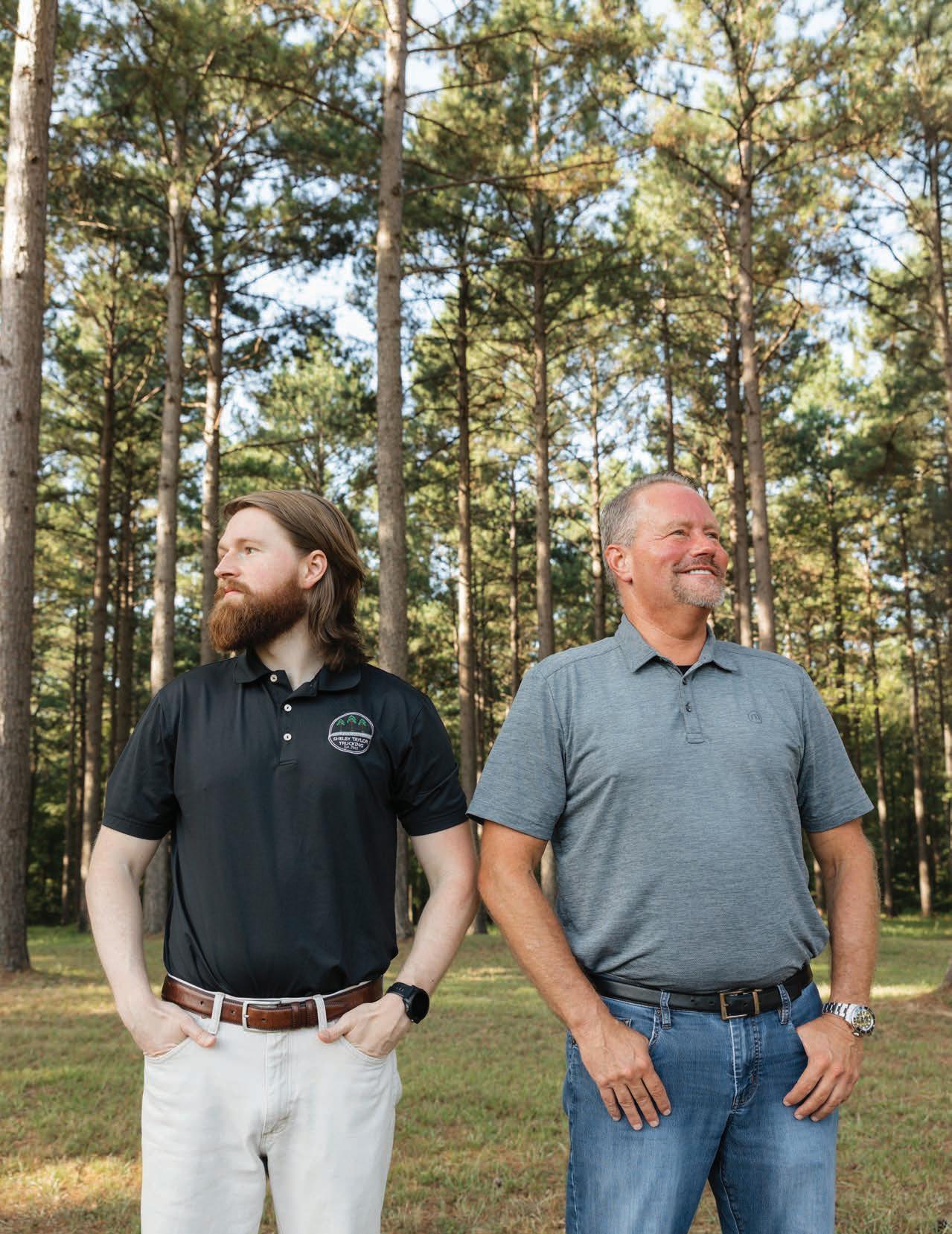
Inside the Taylor family’s multigenerational journey in timber, trucking, and logging.
As you drive the highways and backroads of Arkansas, it's hard to miss the towering pine trees stretching across the landscape. With over half of the state covered in forest, it's no wonder Arkansas is known as The Natural State. Behind these forests are the hardworking families who make their living in the timber and forestry industry—quiet stewards of the land who pass their knowledge down through generations.
These families are the backbone of the industry, and each has a unique story of perseverance and growth. The Taylor family of Grant County is one such story, with three generations bound together by timber, trucking, and a love for the land.
The Taylor family's heritage in forestry began in 1967 with one man named Shelby Taylor. Armed with two chainsaws, a log truck, and his wife, JoAnn, as his bookkeeper, he started cutting salvaged timber that was damaged or struck by lightning.
His small-scale start was just the beginning. Shelby realized there was opportunity in hauling, not just harvesting, and stepped into trucking—laying the foundation for what would become a family business. Working for large timber companies, he hauled logs to a mill in Hot Springs, and before long, Shelby Taylor Trucking was born.

Shelby also dreamed of owning land. For years, he could only purchase 20–40-acre tracts at a time, until opportunity struck. International Paper decided to sell much of their property in the area, and Shelby finally had a chance to buy in.
For Shelby, finally being able to purchase significant tracts of land was a dream realized.
"He couldn't get enough of it because his whole life and career, he didn't have a chance to buy it," recalls Shelby's son, Bobby Taylor, now president of the company.
From that point forward, the heart of the Taylor family business has been clear: growing trees.
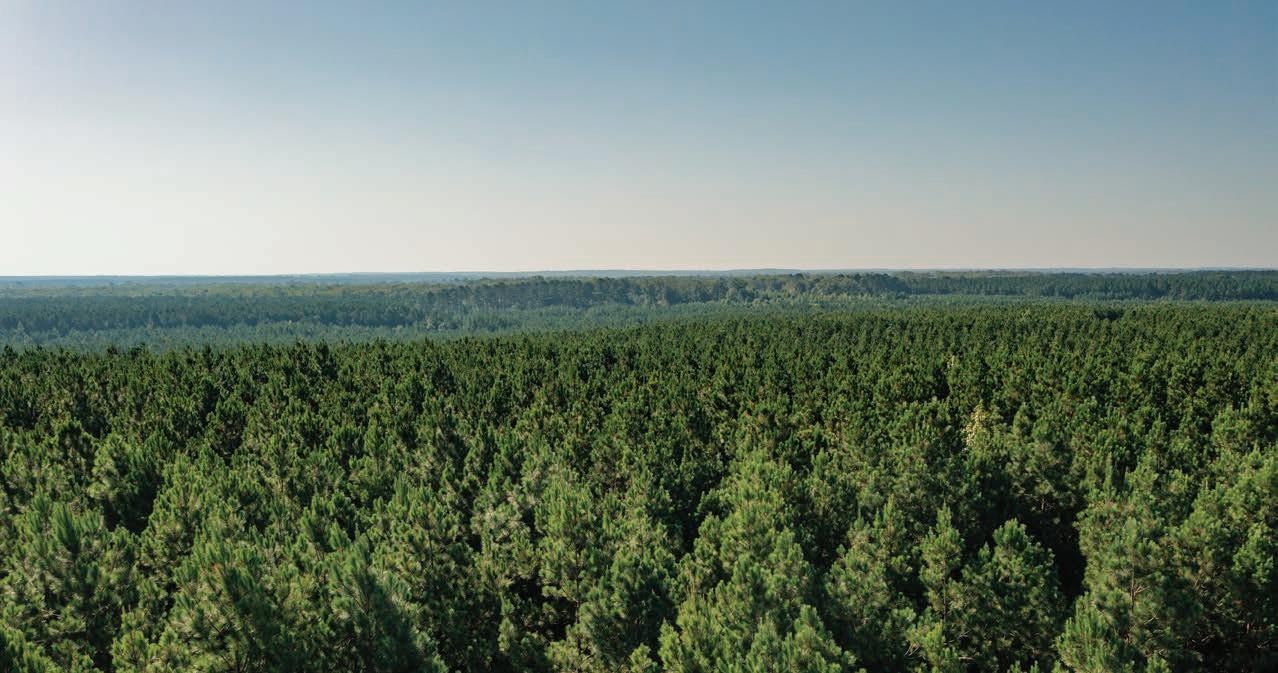
"We love growing trees. It's our business," Bobby says. "We're loggers and we want a healthy forest, and if it's a healthy forest, it will be there forever."
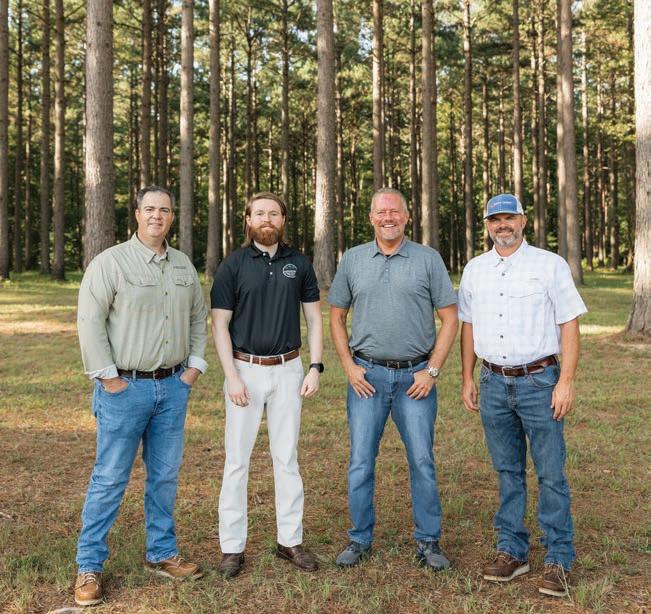
While the company is thriving today, that success was built on decades of careful planning. In 1996, Shelby began handing the reins to his son, Bobby, ensuring the next generation was ready to lead. As part of that succession plan, Shelby made sure Bobby learned the business from the ground up.
Bobby spent summers working in the woods with a chainsaw, fixing truck flats, and tackling whatever tough jobs came up.
"One day, I asked my dad, 'Am I just going to fix truck flats all my life? I can't stand it,'" Bobby recalls. "And he said, 'Do you know why you're doing that? One day you're going to hire somebody and they're going to tell you they know how to do it, but if you don't know how to do it, how are you going to know they're doing it right?'"
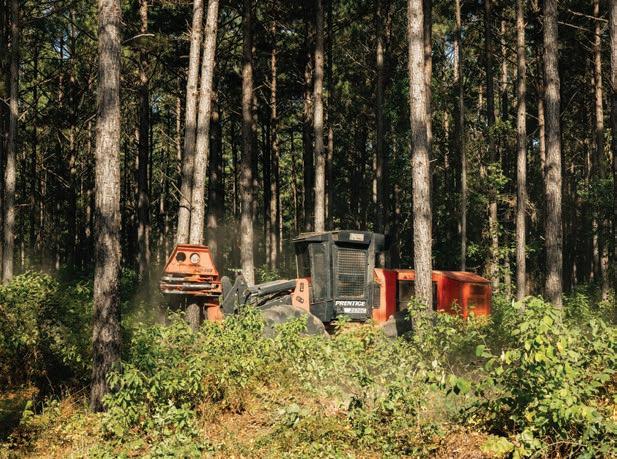
The Taylors are not the only family invested in the success of Shelby Taylor Trucking. Loyalty runs deep among their team, which includes about 50 people— among them multiple father-son pairs and even grandchildren of longtime employees.
Their longest-tenured employee, Clarence, has been driving trucks since the company's beginning. This sense of family, both by blood and by bond, has kept the business rooted for nearly six decades.
Loyalty isn't just found among their employees, but runs in the Taylor family as well. The third generation has now joined the business, with Grant, Shelby's grandson and Bobby's son, serving as vice president and in-house attorney.
"It's really good, but it's challenging," Bobby admits about working alongside his son. "He makes me a way better person. I'm real outgoing and chatty, and he's a thinker. We make a good team."
Those lessons shaped Bobby's leadership style and gave him an appreciation for the people who keep the business moving. Today, Shelby enjoys retirement in the deer woods and by the lake, while Bobby oversees daily operations.
Grant earned his Juris Doctor from the University of Arkansas School of Law in 2022. While Bobby hoped he would return to the family business, he knew it wasn't guaranteed. Luckily, Grant found his way back, and today his legal expertise is invaluable for managing contracts.
Grant has also introduced fresh ideas, including an incentive program that pays drivers by the load with bonuses for surpassing goals. "We want to reward people who put in the extra work," he says.
Technology has become another of Grant's focus areas. He's implemented apps to map land tracts, tracking systems on trucks, and even drones for surveying timber. These tools have made the operation more efficient and, as Bobby puts it, "changed the game."
The family has also stepped into a new era of outreach, sharing their story on social media and even welcoming Governor Sarah Huckabee Sanders to their operation during the state's "Capital for a Day" initiative.
New ideas and technology have carried the business forward, but through every stage of growth, the Taylors say having a reliable financial partner has been key. For them, that partner has been Farm Credit.
"Farm Credit makes it as easy as possible," says Grant. "It's extremely convenient."
Both Bobby and Grant point to fixed-rate financing and a staff that understands the timber industry as reasons they continue to rely on Farm Credit. They also frequently use AgDirect, powered by Farm Credit, to finance equipment purchases and keep their operation moving quickly.
That kind of partnership allows the Taylors to focus on what they do best—growing timber, running trucks, and managing a company where family and community come first.
Nearly six decades after Shelby picked up his first chainsaw, Shelby Taylor Trucking stands as proof that deep roots and strong partnerships can shape a lasting future. Like the forests they tend, the Taylors' legacy continues to grow, thrive, and stand the test of time.
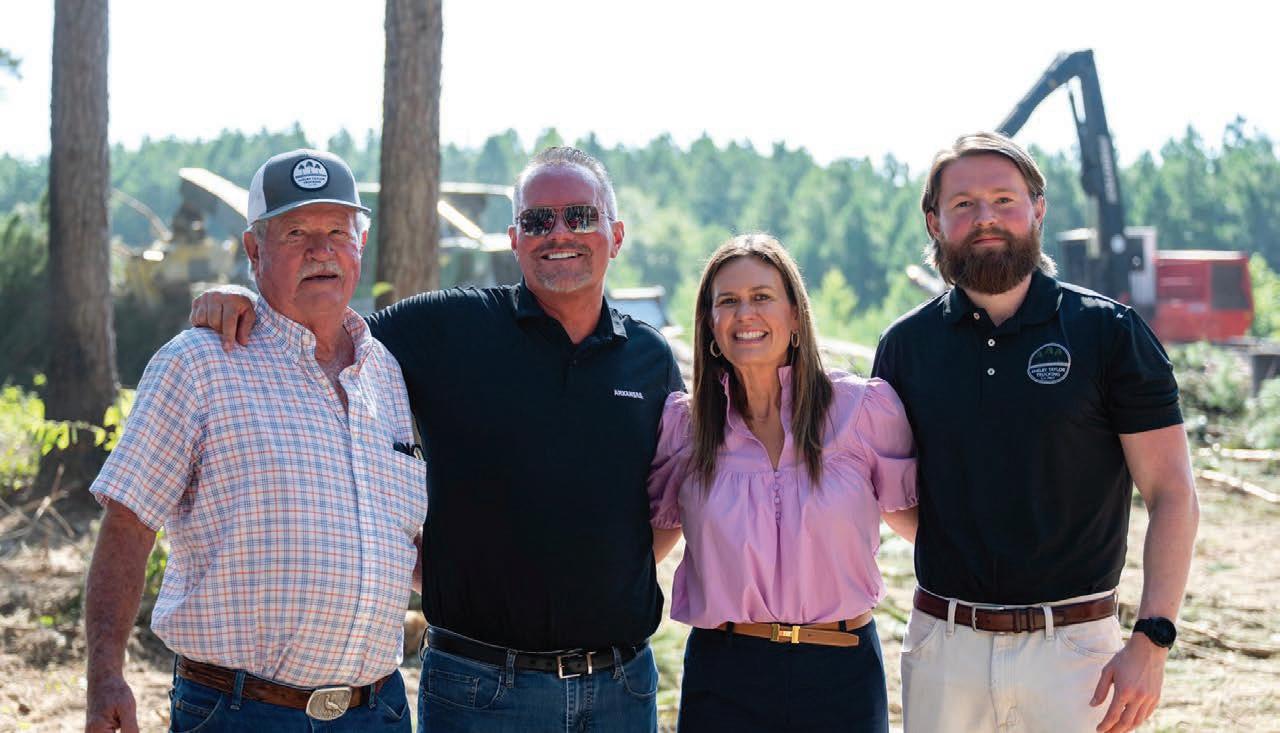
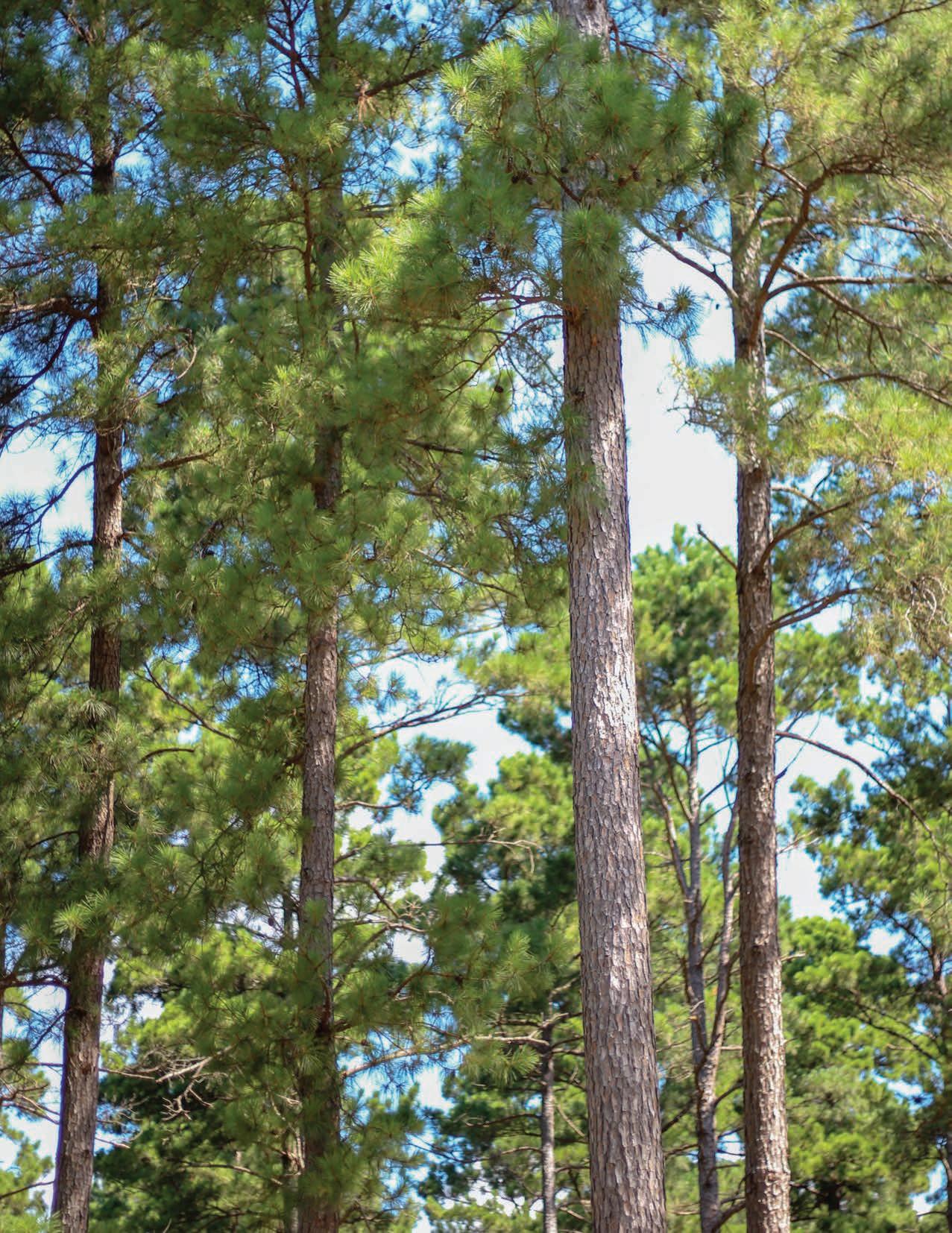
IN 2022, TIMBER WAS ONE OF ARKANSAS' TOP COMMODITIES, GENERATING
IN CASH FARM RECEIPTS.
THE OZARK AND OUACHITA REGIONS CONTAIN OF THE STATE'S FORESTLAND.
FOREST INDUSTRIES CONTRIBUTE TO THE GDP OF ARKANSAS, MAKING IT THE MOST FORESTRY-DEPENDENT ECONOMY IN THE US SOUTH.
ARKANSAS GROWS 25 million tons more timber THAN IT HARVESTS EACH YEAR. SINCE 1978, THE STATE’S TOTAL STANDING TIMBER HAS NEARLY DOUBLED.
FORESTS COVER 19 Million Acres HOUSING 11.5 BILLION TREES. $7+ billion 27,000 jobs 4.1% 88%
WERE PRODUCED IN ARKANSAS IN 2023 (57%) OF ARKANSAS, $455 Million 21,922 tons of timber FOREST COMPOSITION:
THE FORESTRY SECTOR SUPPORTS AND CONTRIBUTES TO THE STATE ECONOMY.
THE OFFICIAL STATE TREE OF ARKANSAS IS THE PINE TREE
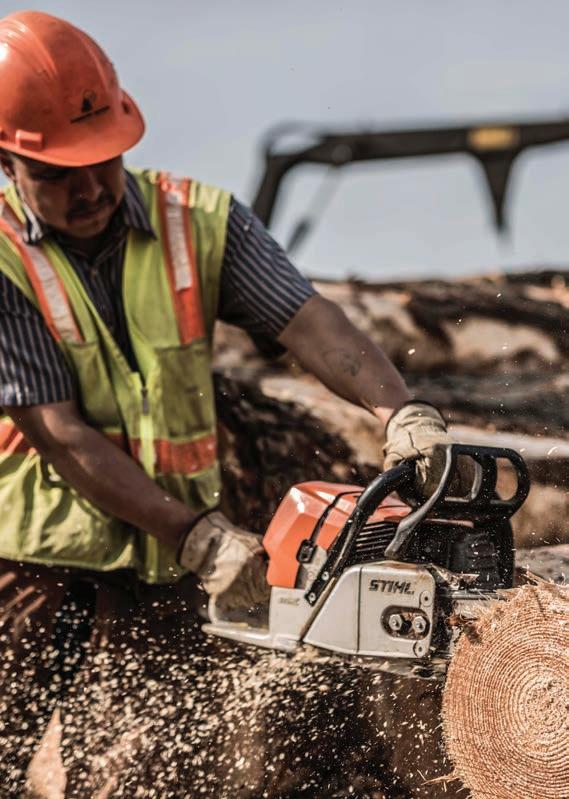



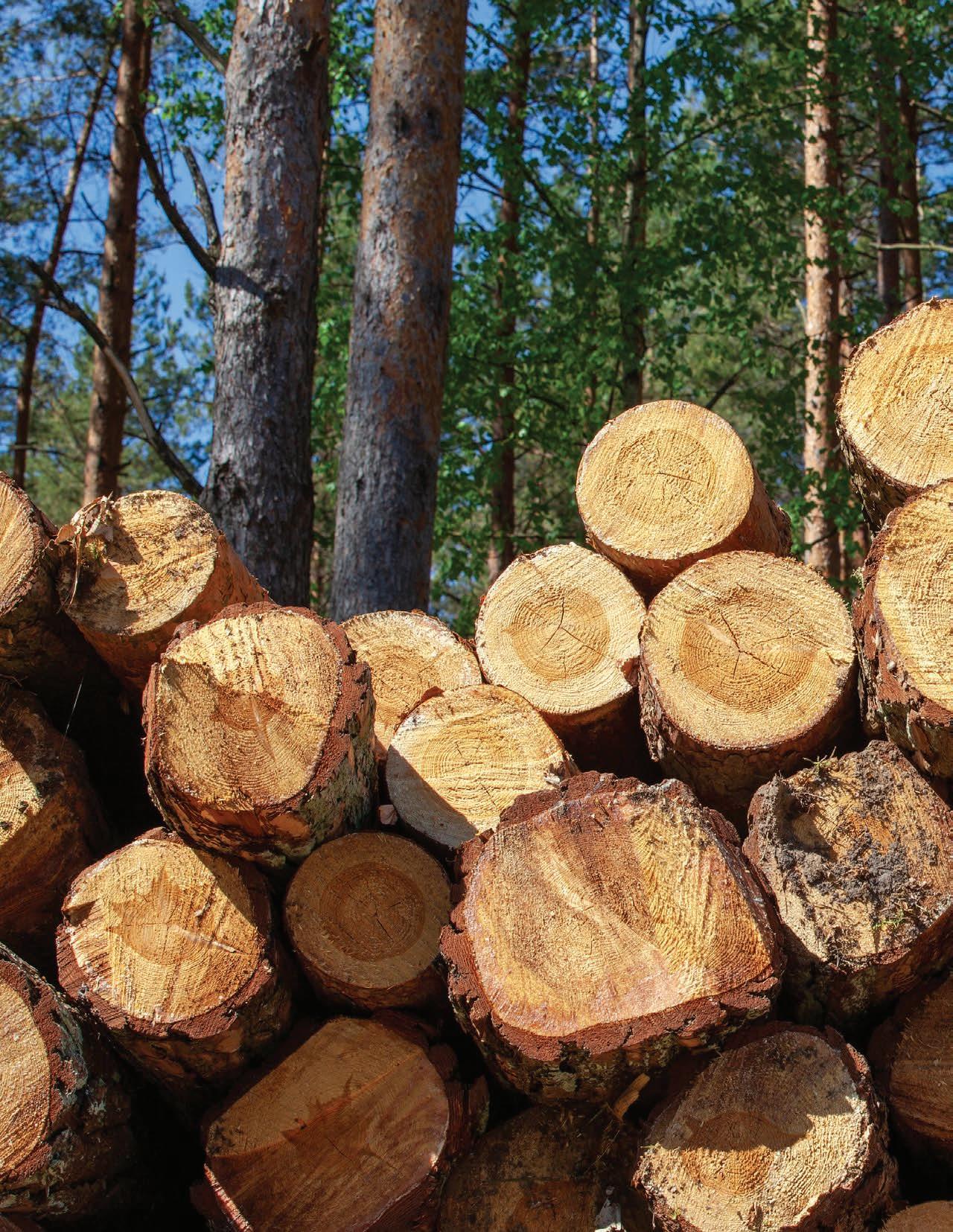
Telling the story of Arkansas forestry comes naturally to the team at the Arkansas Forestry Association (AFA). Every AFA landowner outreach program, newsletter, website posting, podcast, interaction with the news media, public policy advocacy initiative and more, aims to educate an audience about the significant, beneficial impact of growing and utilizing healthy, working forests.
Organized in 1947, AFA is the only private non-profit state trade association that advocates for all components of the timber and forest products sector in Arkansas. And while AFA’s work in the public policy advocacy arena is the number one reason members join the association, telling the forestry story through public education and outreach is the most prevalent activity you will find taking place within the association on behalf of its more than one thousand members. Of those members, by far the largest contingent are private family forest owners. The majority of AFA’s outreach programs focus on this audience.
The AFA Education Foundation (AFAEF) administers public education and outreach programs under the leadership of Rob Beadel, director of forestry education. In 2024, AFAEF hosted or partnered in 15 landowner education workshops and engaged with more than one thousand landowners who manage almost 237,000 acres. These workshops cover a wide range of forest management topics such as prescribed fire, invasive plant species and emerging forest health issues. AFAEF, in partnership with the Arkansas Tree Farm Program, hosted its first statewide forestry forum last year and plans to make the forum an annual event.
"AFA wanted to create a program for forest landowners that would provide information on a variety of forestry-related topics," Beadel said. "And build upon these programs providing content that is beneficial to all forest landowners regardless of what their management objectives are."
In addition to landowner outreach, AFAEF administers Project Learning Tree, the award-winning PreK-12 environmental education curricula that instructs students “how to think, not what to think” about complex environmental issues. In addition, AFAEF annually hosts three, two-day Teacher Conservation Tour workshops and a Green Careers Expo that focuses on various aspects of forest management, forest products and other forestry related topics. Combined with AFA and AFAEF’s growing attention to workforce development within the timber and forest products sector, these outreach programs help promote green career opportunities for students and encourage educators to include environmental education in the classroom.
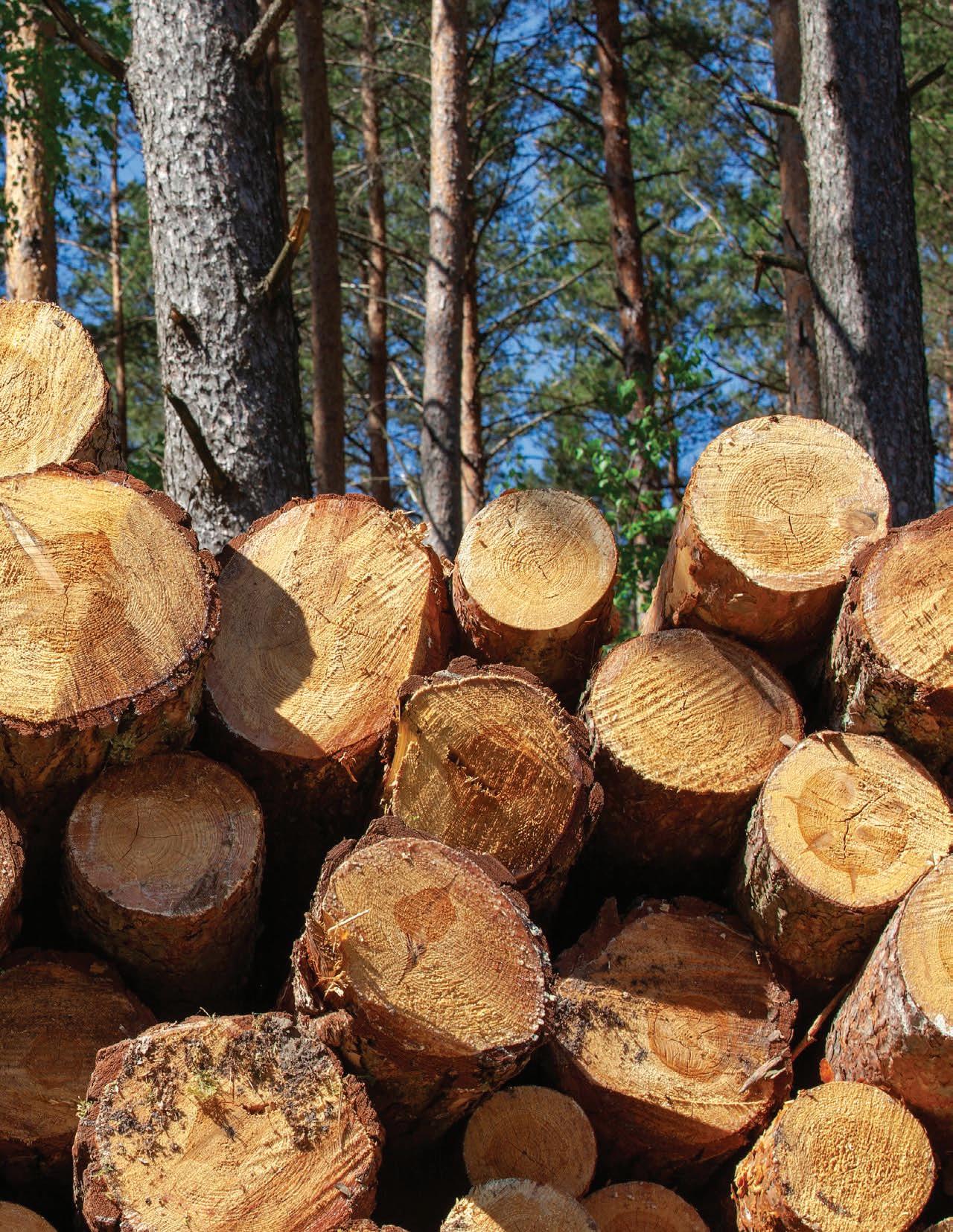
One of the more unique and exciting landowner initiatives is the Women Owning Woodlands (WOW) program. Facilitated by Anna Sparks, AFA’s director of business and Tree Farm Program administrator, WOW provides female-focused forestry programming through virtual and in-person workshops, field tours, printed and on-line information and through social media.
“I’m thrilled that WOW continues to grow and that the program continues to equip women with the resources they need to actively manage their timberland,” Sparks said. “Anyone is welcome to attend WOW events, but we certainly want them to provide a venue where attendees feel comfortable asking questions, learning from each other and from our speakers. Recent WOW topics have included techniques for creating good forest habitat, as well as factors that contribute to poor habitat; fire behavior and factors that influence it, and the benefits of creating pollinator habitat. And because Sparks coordinates both the WOW and Tree Farm programs, she regularly introduces concepts that mirror the management standards required of Tree Farm members.
The impact of the Arkansas Tree Farm Program on sustainable forest management is significant. The third-party certified program, aimed at private family forest owners, serves approximately 500 landowners and covers about 2,600 properties statewide. Tree Farm members receive regular communication from AFA through newsletters, have access to multiple workshops and tours, and most importantly, are part of an active network of forestry professionals and family forest owners.
“Helping landowners find the tools they need to actively manage their property, whether it’s a piece of information or a professional forester to help write a management plan, inspect their property or just give sound advice is such a rewarding part of my job,” Sparks said. “And then to see the results on display when you visit one of our member’s tree farms is a thrill.”
AFA provides resources for its members, students, and educators, but what about the public? There is a wealth of information on the AFA website at www.arkforests.org, including a Buyer’s Guide filled with forestry service providers. Plus, you can find the “Voices of Forestry” podcast. Now up to almost 70 episodes, it was one of the first association-based forestry podcasts in the nation and is a virtual “forestry 101”. Hosted by AFA Communications Coordinator Seth Stephenson, the podcast features a different voice of forestry each month sharing his or her expertise.
The podcast and all the association’s outreach programs are designed to help people think, answer their questions, share information that maybe they’ve never considered before and ultimately, build understanding that members of the timber and forest products community can be trusted to keep our working forests working and healthy in order to deliver everything we need and want from them today and in the future.
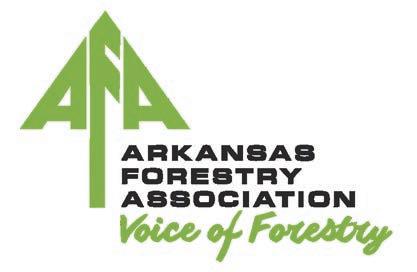
Farm Credit of Western Arkansas is proud to announce the list of 40 scholarship recipients for 2025-26 school year. Scholarship recipients are either members or the child/grandchild of a member.
The scholarships are awarded based on academic achievement, demonstrated leadership, extracurricular involvement, volunteer activities, and financial need. $40,000 in total will be awarded this year.








































Congratulations to our scholarship recipients! 2026 scholarship information will be available on myaglender.com beginning January 2026.
Can you hear it? Distant laughter, baa-ing lambs and the whoosh of a rumbling roller coaster. The unmistakable aroma of perfectly-crisp fried food floats through the air as colorful ribbons find their way to myriads of deserving projects.
It’s fair season! Here’s how to experience your fair to the fullest:
The youth in your community have dedicated months readying their livestock projects for the fair. This week is the culmination of their hard work. Check out the farm animals from the smallest fluffy rabbit to the powerful steer.

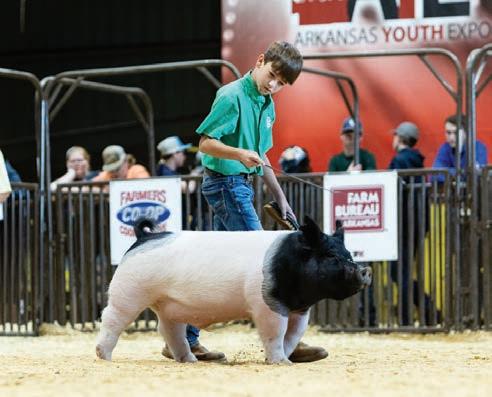
Try out the rides
From flash-fast spinning coasters to peaceful merry-go-rounds, the perfect ride awaits each and every thrill-seeker. Check out ride bands or passes for great deals on your thrills.

Check out the creative exhibits
Cookies, jams, houseplants, pumpkins, paintings, photographs and quilts! These are but a mere glance at the creativity your local fair has to showcase. Step inside the exhibit hall and admire the entries - you may leave inspired to create your own!
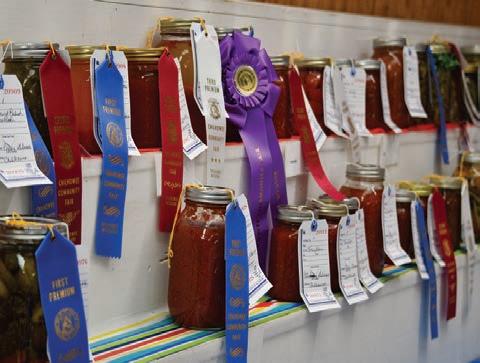

Have you ever tried spicy pickle pizza? You may be surprised by the array of delectables waiting for you at the fair. Be sure to bring a large appetite - and don’t forget the funnel cakes.

Dazzling gowns, twinkling tiaras and graceful sashays will greet you at your fair’s pageant. Admire the dedication, professionalism and poise of your local fair queens and show support during their annual competition.
The sun’s golden rays reflect on a guitar as it strum-strum-strums into tune. Soon enough, the entire fairgrounds will be buzzing along to the band. Don’t miss out - discover what artists may be visiting a fairgrounds near you.
Try your hand at the carnival games
Whether you’ve been eyeing that stuffed bear, you’d like a new goldfish pal, or your dart-throwing skills need showcased, you’ll find just what you’re looking for at the fair. One of the most classic fair experiences, and a must for any and all visitors.

By Flossie Glinski
Arkansas is one of the most timber-dependent states in the U.S. Over half the state is forested, and timber contributes 4.1% to the state’s GDP. In Western Arkansas alone, Farm Credit serves 41 counties, giving us a front-row view of how timber cycles shape land investment and lending.
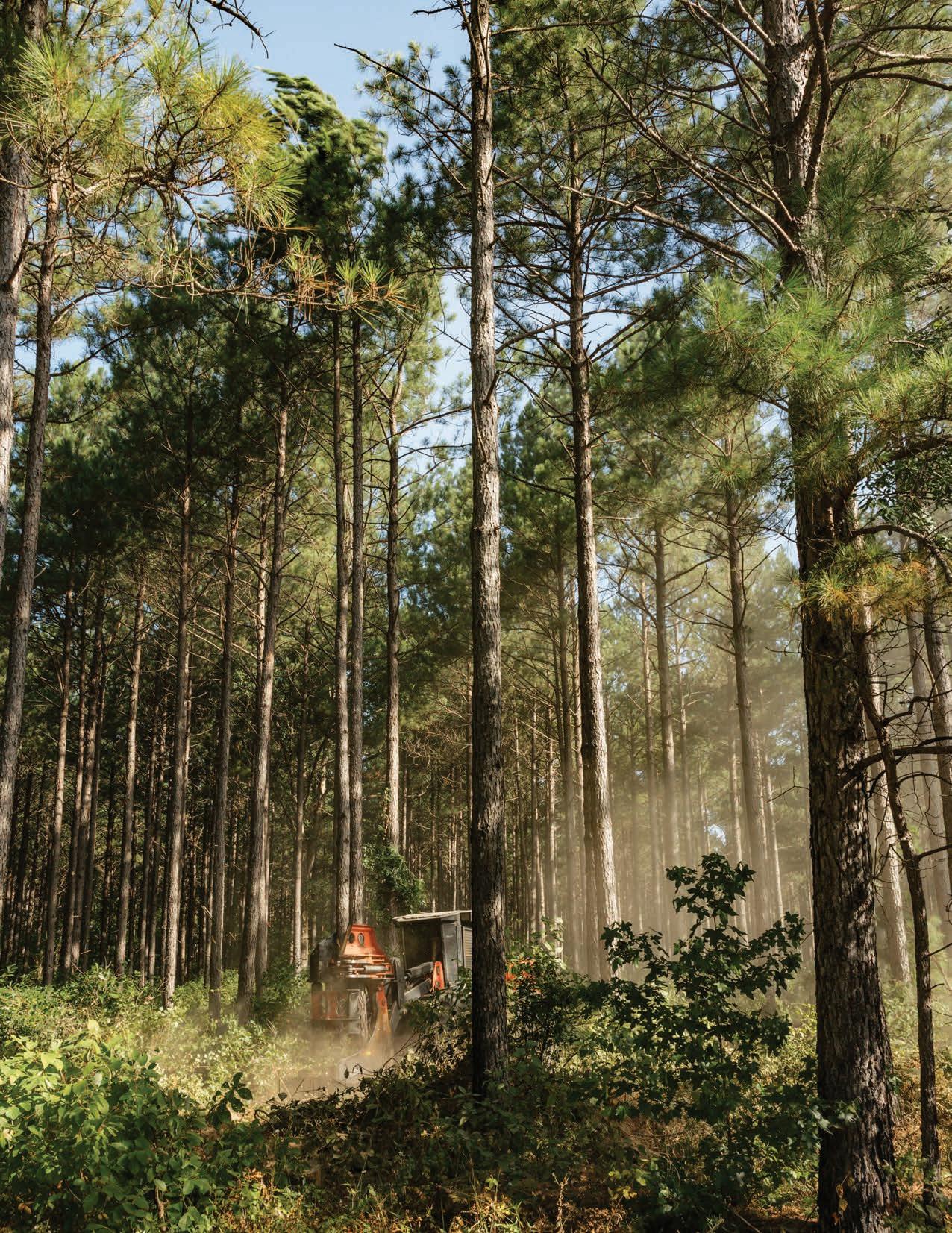

Charlie McConnell SVP and Chief Lending Officer
Timberland is a long-term asset. Harvest cycles often last 15 to 30 years, depending on species and management. Because of this, loan structures look different than traditional farm or home loans:
• Longer loan terms align with the growth cycle of trees.
• Interest-only payments may be offered early, before any harvest income.
• Balloon payments can be scheduled to match expected timber sales. Lenders must also account for price swings tied to housing starts and construction demand.
Timberland financing has unique challenges:
• Valuation: Land value and standing timber both factor into the appraisal. Farm Credit uses in-house foresters and appraisers trained in these specialized methods.
• Cash flow: Unlike farms or homes, timberland may not generate income for years.
• Collateral risk: Timber can be lost to storms, fire, pests, or price downturns, so loan terms must reflect that risk. Forestry consultants and harvest schedules are often part of the underwriting process, making timber loans more specialized than other real estate lending.
Timberland is gaining recognition as a strong, diversified investment. Benefits include:
• Inflation protection – Timber grows in both volume and value over time.
• Lower market correlation – Returns are often steadier than stocks.
• Tangible value – Investors gain from both land appreciation and timber sales. Institutional investors and family offices are expanding their holdings in Western Arkansas, where land is abundant, stable, and competitively priced.
Timberland carries a dual source of value:
• Land – generally stable and appreciating.
• Standing timber – measurable with inventory reports and growth projections. Tools like timber cruises and GIS mapping help lenders assess value, though risks like oversupply, fire, and disease must also be considered. Notably, Western Arkansas’s standing timber volume has nearly doubled over the past 30 years, adding to today’s supply pressures.
The Arkansas timber market faces mixed conditions:
• Oversupply: More timber is growing than being harvested, pushing prices down.
• Soft markets: Pine pulpwood and some hardwood products remain weak due to excess supply and low demand.
• Housing slowdown: High mortgage rates have reduced new home construction, cutting lumber demand.
Even with these challenges, Western Arkansas remains a strong location for timber investment. The region’s vast forests, established forestry industry, and new opportunities in mass timber construction and bioenergy keep timberland financing a strategic part of our rural economy.


Several of our branches participated in Teacher Appreciation Week by visiting their local educators with tokens of appreciation and words of thanks.

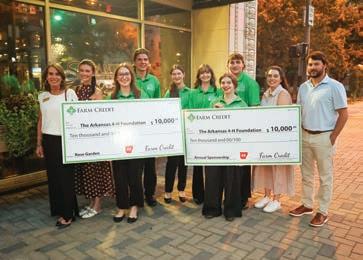


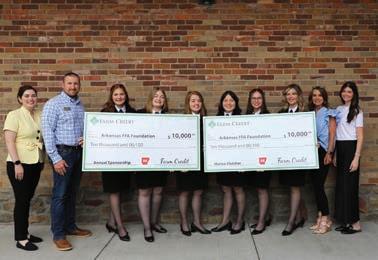

Representatives from three Arkansas Farm Credit associations joined the newly elected 4-H and FFA state officers for dinner and discussion about their year of service.
U.S. Senator John Boozman was recognized with the Friend of Farm Credit Award. This national honor is bestowed by the Agribank District Farm Credit Council to one U.S. Senator and one U.S. Representative each year for their outstanding service to agriculture and rural communities.
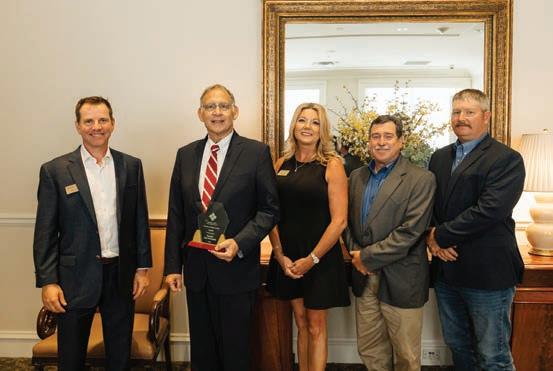
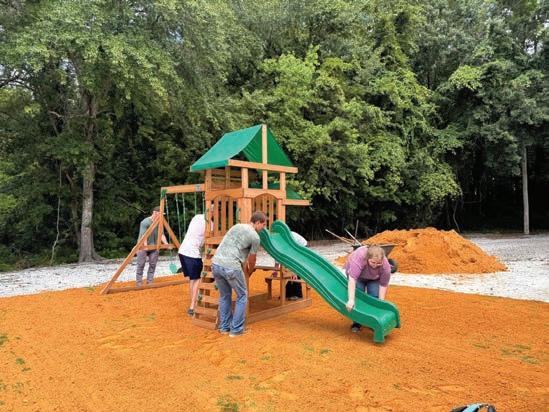
Friend of Farm Credit Award The CALL
Spark, our employee engagement group, volunteered with The CALL in Columbia and Lafayette Counties to lay turf and arrange play equipment for their outdoor play area. The CALL is a local nonprofit organization that supports children and youth in foster care.
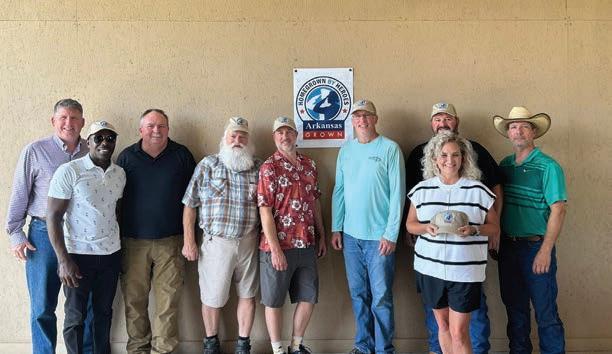
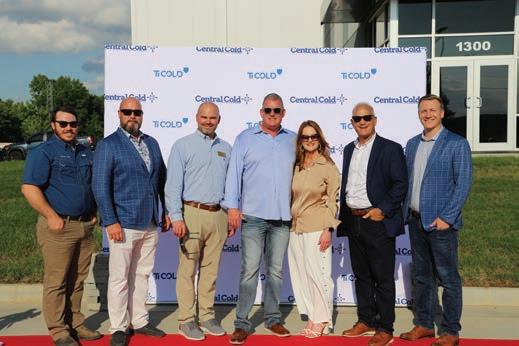
In partnership with the Arkansas Department of Agriculture, a special luncheon was organized for farmer-veterans at Rusher Family Farms in Scott, Arkansas. These Homegrown by Heroes members came together to share stories, build connections, and celebrate their shared commitment to our country and Arkansas agriculture.
Farm Credit representatives attended the successful ribbon-cutting at the state-of-the-art Central Cold facility in Conway, Arkansas. Spanning over 135,000 square feet, this facility is strategically designed to meet the cold storage needs of central Arkansas.
Arkansas Forestry Association hosted their Second Annual Forest Landowner Forum at Farm Credit’s main campus in Russellville.
In partnership with the Arkansas Department of Agriculture, Farm Credit has awarded $10,500 to 21 local farmers markets through the Farmers Market Promotion Program.
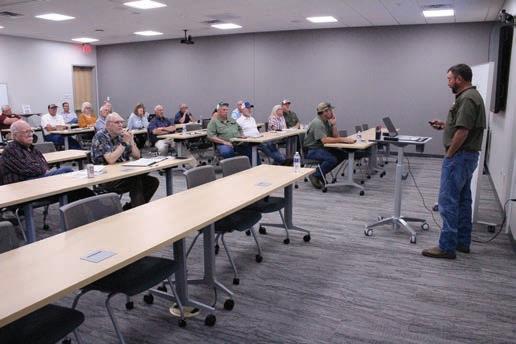
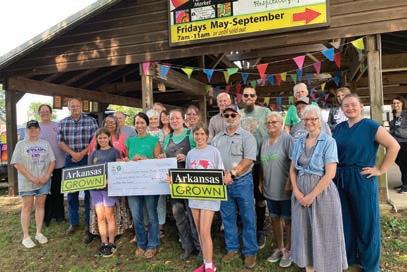

Spark took a trip to Stobaugh Brothers Farm in Conway County to learn more about their long-standing operation.
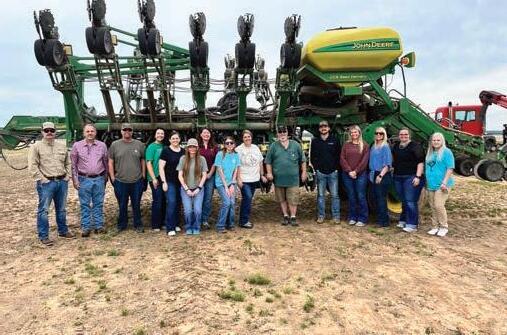
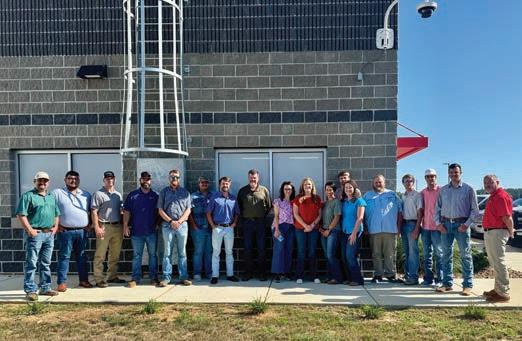
Title Sponsor
Farm Credit was the proud title sponsor of the 98th Arkansas FFA Convention and Expo. During the convention, Farm Credit also awarded scholarships to four outstanding Arkansas FFA members
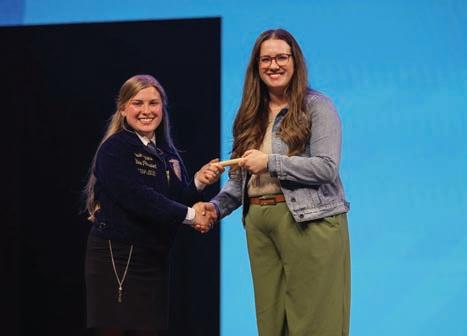

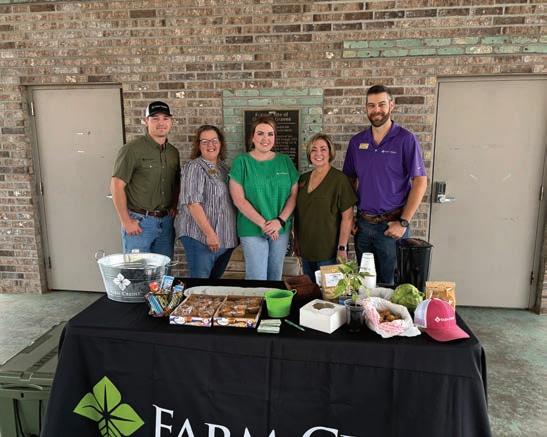

DARLA COLVIN joined the Morrilton branch in May as a loan documentation specialist. Darla grew up in Louisiana but moved to Morrilton, Arkansas, in high school where much of her family resides. She has 20+ years of experience in the legal and banking industry and 12 years of loan processing and documentation experience within the Farm Credit system. She recently moved back to Conway County with her husband, Lynn, and their three Jack Russell shorties. In her free time, Darla enjoys camping, reading, and keeping up with her three kids.

ISRAEL LOPEZ joined the Ozark branch in May as an agricultural loan officer. Israel has 10 years of banking experience, beginning his career as a teller before being promoted to loan officer trainee, business development officer, and most recently, loan officer. Among his other accolades are completing consumer lending and mortgage lending school. Israel lives in Van Buren, Arkansas, with his wife, Ashlyn, and their two children. Outside of work, Israel enjoys serving as a volunteer soccer coach for the Alma Soccer League and spending time with his family.

YASMIN PACHECO transitioned from risk analyst intern to joining Farm Credit full-time as an associate data analyst.

PAM JORDAN retired in July after 32 years of service to Farm Credit. Pam began her career in 1994 and has served in a variety of roles throughout the organization, most recently as tech administrator. She is looking forward to enjoying retirement with new adventures, quality time with family, and extra travel.



JEFF HELEY joined the Farm Credit team in July as an audit and review specialist. Jeff comes with more than 30 years of experience, 28 of that being in the Farm Credit system. He most recently served as the senior vice president of audit for AgCountry FCS and held various roles with AgCountry and commercial banks over his career. Jeff grew up on a farm in North Dakota. In his spare time, he enjoys spending time with his family, fishing, and golfing.

ALLIE MCCONNELL joined the Morrilton branch in May as a Customer Service Representative. She is from Umpire, Arkansas, where her family runs a cattle operation. She recently graduated with an agribusiness degree from Arkansas Tech University. At ATU, she served as an ambassador for the ag department and was a member of Collegiate Farm Bureau, Sigma Alpha Professional Sorority, and Arkansas Cattlemen’s Association. Outside of work, Allie enjoys taking her Australian shepherd, Maggie, on walks and spending time with family and friends.

MELISSA SMITH transitioned from customer service representative to branch operations manager.

DONNA PAYNE retired in July after 33 years of service to Farm Credit. Donna spent the first 10 years of her career in the former Conway branch, and has been a familiar face in the Morrilton office since it was built, serving as a customer service representative. She is looking forward to extra family time, attending her grandkids’ sporting events, and traveling.


5177 US Hwy 64 W
Let Farm Credit’s industry-leading knowledge, competitive products, and more than 109 years of agricultural and rural financing experience help you.
• Farms of all sizes
• Livestock
• Country home and home construction
• Land
• Recreational land
• Timber tracts
• Forestry products and processing
